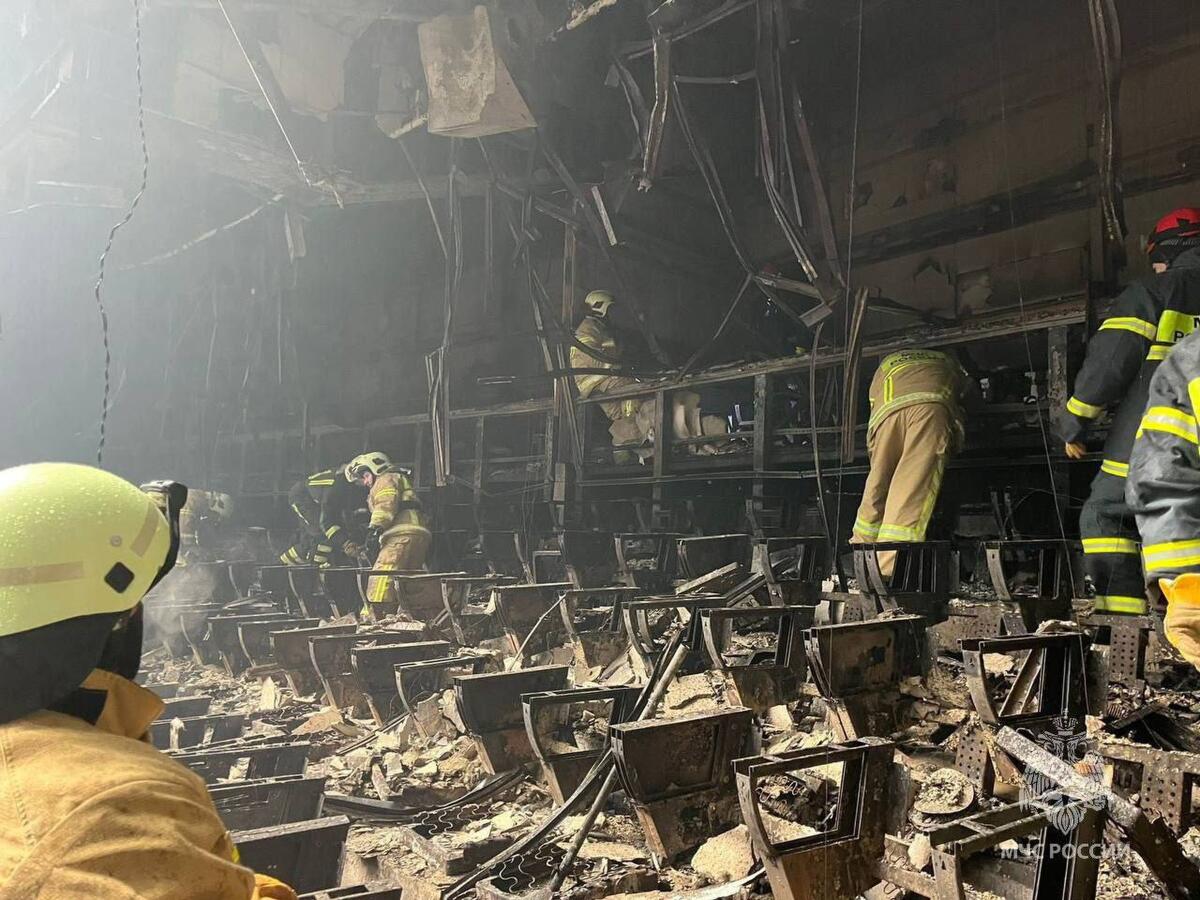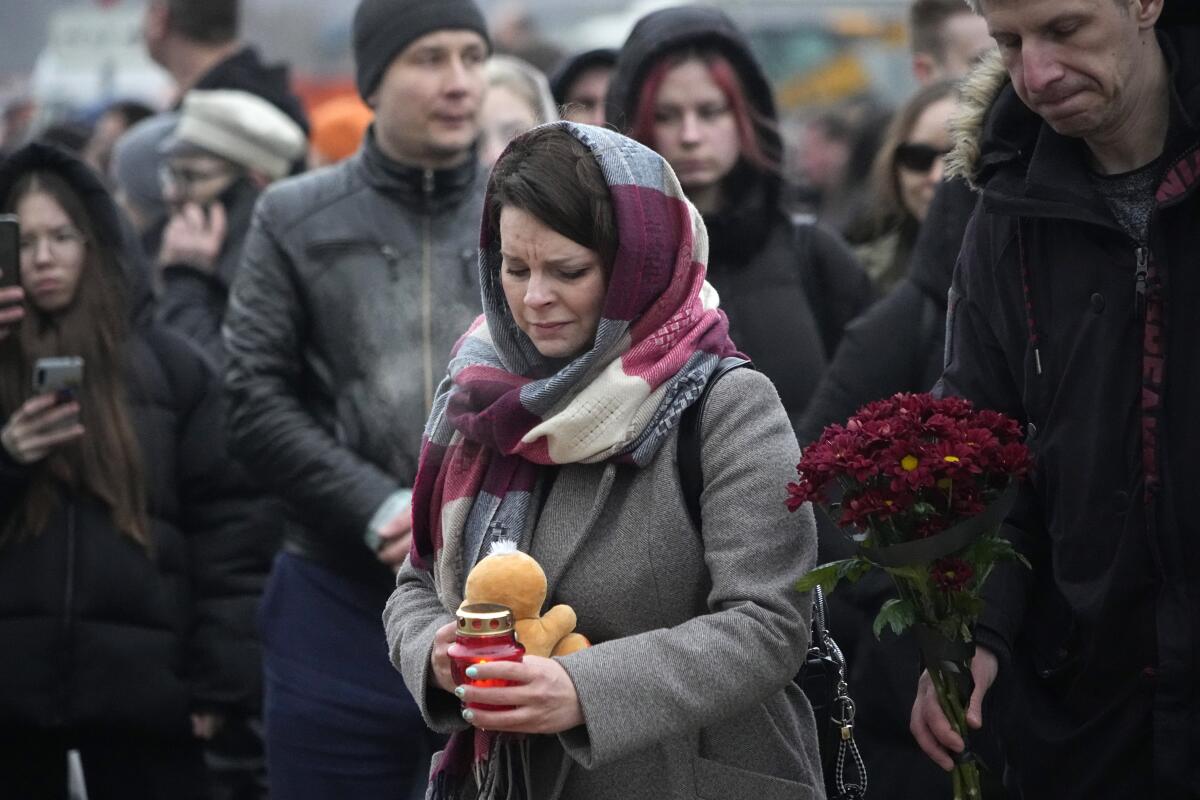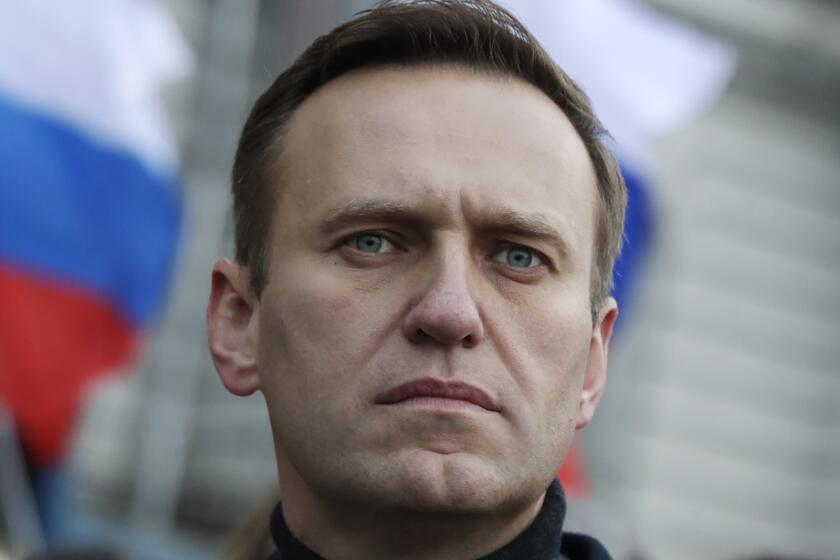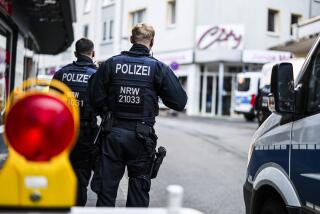Islamic State behind deadly attack on Russian concert hall, U.S. confirms. Putin tries to link Ukraine

- Share via
MOSCOW — Russian authorities arrested four men suspected of carrying out the attack on a suburban Moscow concert hall that killed at least 133 people, President Vladimir Putin said Saturday in an address to the nation.
The Islamic State militant group’s Afghanistan branch claimed responsibility in statements posted on affiliated channels on social media. U.S. intelligence officials confirmed the claim by the extremist group.
“ISIS bears sole responsibility for this attack,” National Security Council spokeswoman Adrienne Watson said in a statement, using an acronym for Islamic State.
The U.S. shared information with Russia in early March about a planned terrorist attack in Moscow and issued a public warning to Americans in Russia, Watson said.
Putin did not mention Islamic State in his speech, but claimed the attackers had been trying to cross the border into Ukraine, which, he said, tried to create a “window” to help them escape.
Ukraine has strongly denied any involvement and accused Moscow of using the attack to try to stoke fervor for its war on the neighboring country.
Watson said, “There was no Ukrainian involvement whatsoever.”

Putin said authorities detained a total of 11 people in the attack, which also injured more than 100 concertgoers and left the Crocus City Hall venue in Krasnogorsk, on Moscow’s western rim, a smoldering ruin. He called the attack “a bloody, barbaric terrorist act.”
Russian media broadcast videos that apparently showed the detention and interrogation of the suspects, including one who told the cameras he was approached by an unidentified assistant to an Islamic preacher via a messaging app channel and was paid to take part in the raid.
Russian news reports identified the gunmen as citizens of Tajikistan, a former Soviet republic in Central Asia that is predominantly Muslim and borders Afghanistan. Up to 1.5 million Tajiks have worked in Russia and many have Russian citizenship.
Tajikistan’s Foreign Ministry, which denied initial Russian media reports that mentioned several other Tajiks allegedly involved in the raid, did not immediately respond to a request for comment about Saturday’s arrests.
Many Russian hard-liners called for a crackdown on Tajik migrants, but Putin appeared to reject the idea, saying that “no force will be able to sow the poisonous seeds of discord, panic or disunity in our multiethnic society.”
He declared Sunday a day of mourning and said that additional security measures have been imposed throughout Russia.
The attack, the deadliest in Russia in years, is a major embarrassment to the Russian leader just days after Putin cemented his grip on power for another six years. His highly orchestrated electoral victory followed the harshest crackdown on dissent since Soviet times and came as the war on Ukraine dragged into a third year.
In a Ukrainian village, a woman wants only one thing: to find her husband, who disappeared shortly after Russia’s war on Ukraine started two years ago.
Some commentators on Russian social media questioned how authorities, who have relentlessly suppressed any opposition activities and muzzled independent media, failed to prevent the attack despite the U.S. warnings.
The attack came two weeks after the U.S. Embassy in Moscow issued a notice urging Americans to avoid crowded places in view of “imminent” plans by extremists to target large Moscow gatherings, including concerts. Several other Western embassies repeated the warning.
Putin denounced the warning as an attempt to intimidate Russians. “All that resembles open blackmail and an attempt to frighten and destabilize our society,” he said.
Putin’s claim that the attackers tried to flee to Ukraine followed comments by some Russian lawmakers who pointed the finger at Kyiv immediately after the attack.
Ukrainian President Volodymyr Zelensky angrily rejected Moscow’s accusations as an attempt by Putin and his lieutenants to shift the blame to Ukraine while treating their own people as “expendables.”
“They are burning our cities — and they are trying to blame Ukraine,” he said in a statement on his messaging app channel. “They torture and rape our people — and they blame them. They drove hundreds of thousands of their terrorists here to fight us on our Ukrainian soil, and they don’t care what happens inside their own country.”
Images shared by Russian state media Saturday showed a fleet of emergency vehicles still gathered outside the ruins of Crocus City Hall, which could hold more than 6,000 people and has hosted many big events, including the 2013 Miss Universe beauty pageant that Donald Trump helped produce.
On Friday, crowds were at the venue for a concert by the Russian rock band Picnic.
Videos posted online showed gunmen in the venue shooting civilians at point-blank range. Russian news reports cited authorities and witnesses as saying the attackers threw explosive devices that started a fire that eventually consumed the building and caused its roof to collapse.
Russian President Vladimir Putin’s government has evolved from tolerating dissent to ruthlessly suppressing any activities or people who dared challenge it.
Dave Primov, who survived the attack, told the AP that the gunmen were “shooting directly into the crowd of people who were in the front rows.”
He described the chaos in the hall as concertgoers rushed to leave the building: “People began to panic, started to run and collided with each other. Some fell down and others trampled on them.”
After he and others crawled out of the hall into nearby utility rooms, he said he heard pops from small explosives and smelled burning as the attackers set the building ablaze. By the time they got out of the massive building 25 minutes later, it was engulfed in flames.
“Had it been just a little longer, we could simply get stuck there in the fire,” Primov said.
President Vladimir Putin extends his reign over Russia in a landslide election whose outcome was never in doubt.
Alexei Navalny, Russia’s best-known opposition figure, has died in a prison colony, authorities say. Biden and other Western leaders blame Putin.
In Moscow, hundreds of people stood in line Saturday to donate blood and plasma, Russia’s Health Ministry said. Messages of outrage, shock and support for the victims and their families have streamed in from around the world.
White House Press Secretary Karine Jean-Pierre said in a statement that the U.S. condemned the attack and noted that Islamic State is a “common terrorist enemy that must be defeated everywhere.”
Islamic State, which lost much of its ground after Russia’s military action in Syria, has long targeted Russia. In a statement posted by the group’s Aamaq news agency, Islamic State’s Afghanistan affiliate said it had attacked a large gathering of “Christians” in Krasnogorsk.
On Saturday, the group issued a new statement on Aamaq saying the attack was carried out by four men who used automatic rifles, a pistol, knives and firebombs. It said that attackers fired at the crowd and used knives to kill some concertgoers, casting the raid as part of Islamic State’s ongoing war with countries that it says are fighting Islam.
In October 2015, a bomb planted by Islamic State downed a Russian passenger plane over the Sinai Peninsula, killing all 224 people on board, most of them Russian vacation-goers returning from Egypt.
The group, which operates mainly in Syria and Iraq but also in Afghanistan and Africa, also has claimed several attacks in Russia’s volatile Caucasus and other regions over the years. It recruited fighters from Russia and other parts of the former Soviet Union.
The group’s Afghanistan affiliate is known variously as ISIS-K or IS-K, taking its name from Khorasan province, a region that covered much of Afghanistan, Iran and Central Asia in the Middle Ages.
The affiliate has thousands of fighters who have repeatedly carried out attacks in Afghanistan since its government was taken over in 2021 by the Taliban, a group with which ISIS-K is at bitter odds.
ISIS-K was behind the August 2021 suicide bombing at Kabul airport that left 13 American troops and about 170 Afghans dead during the chaotic U.S. withdrawal. It also claimed responsibility for a bomb attack in Kerman, Iran, in January that killed 95 people at a memorial procession.
On March 7, hours before the U.S. Embassy warned about imminent attacks, Russia’s top security agency said it had thwarted an attack on a synagogue in Moscow by an Islamic State cell, killing several of its members in the Kaluga region near the Russian capital. A few days before that, Russian authorities said six alleged members of the group were killed in a shootout in Ingushetia, in Russia’s Caucasus region.
More to Read
Sign up for Essential California
The most important California stories and recommendations in your inbox every morning.
You may occasionally receive promotional content from the Los Angeles Times.

















